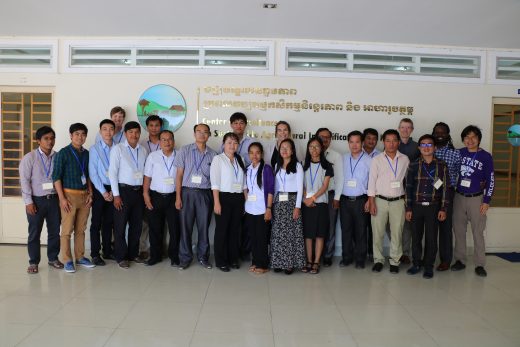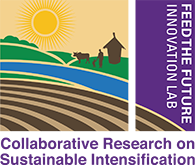The SIIL team is working with each focus country to establish indicators and measurements to assess how an innovation or technology is achieving sustainable intensification. The SI assessment framework is a flexible tool that can fit each country individually and help each project assess how a given innovation is helping the farming systems move to sustainable intensification.
In-country training
The initial trainings for the SI Assessment framework took place at the annual meeting of SIIL in Manhattan, Kansas with project investigators. A continuation of this training will take place in Cambodia and Senegal with in-country scientist, technicians, and project coordinators. By offering trainings in each focus country we are able to engage with in country partners and specifically operationalize the framework for each project. These trainings support each sub-award towards each of its goals. The goal of the overall SI assessment framework is to provide a common framework that can guide research on sustainable intensification and facilitate cross program learning and assessment.
Since sustainable intensification is inherently interdisciplinary, more than one domain is considered. The five domains of sustainable intensification, each considered and measured within the SI assessment framework, are:
• Social
• Economic
• Human condition
• Environment
• Productivity
During these trainings, researchers will have the opportunity to use actual data sets to learn how to fully operationalize the framework categories and perform a multidisciplinary trade-off analysis. Each SIIL subaward is working on new innovations suited for their individual country needs. For example, yoke innovation in Burkina Faso. The framework will help subawards analyze the effectiveness of innovations and how the innovation effects each discipline and domain.

Assessing innovations from every angle
Effective assessment begins by collecting correct data. Data collected related to the most relevant indicators to each respective innovation will most objectively evaluate the innovation in relation to previous practices or the in-country status quo. This assessment enables stakeholders to objectively evaluate research based on the importance each stakeholder assigned to each indicator.
Often, researchers do not have technical backgrounds across multiple domains, but the researcher understands that a given practice may have an effect across these domains. The SI assessment framework is particularly valuable for not only helping researchers select appropriate multidisciplinary indicators to measure across the five domains but also provides detailed methods on how to appropriately collect such data.
Next, trade-offs and synergies between the five domains will be visualized in order to fully assess the value of the innovation. Researchers can consider how potential research might positively or negatively affect each domain. This approach really looks at the system as a whole and considers the broader farming and livelihood systems.

These assessments will inform not only scientific literature but also farmers, community members, NGOs, and other stakeholders. The assessments will also enable researchers to anticipate potential synergies and minimize unintended negative consequences through research design. The framework will also be beneficial to monitoring and evaluation efforts.
The analysis may consider the effect of a given innovation across four different scales: plot level, farm level, household level, and the landscape level. The landscape level refers to a larger scale level referring to communities, watersheds, districts, provinces, etc. The scale at which the data is collected and analyzed is determined by the goals of a given innovation and project.
Taking trade-offs from a conceptual idea to a visual representation empowers small-holder farmers and in-country partners to make decisions regarding innovation adoption. Overall, the SI assessment framework will act as a decision-making support tool in each focus country and help the donor and research community understand how a given technology is helping our farming systems achieve sustainable intensification.


